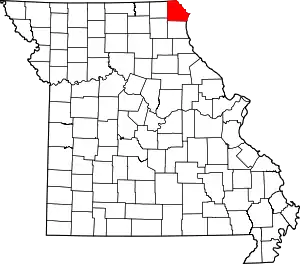Wyaconda, Missouri
Wyaconda is a city in Clark County, Missouri, United States. The population was 227 at the 2010 census. The city was organized in 1888 and is named after a Siouan name for God or the Great Spirit.[6] The first land purchased from the Santa Fe and Land Co. was in 1888.
Wyaconda, Missouri | |
|---|---|
 Location of Wyaconda, Missouri | |
| Coordinates: 40°23′23″N 91°55′35″W | |
| Country | United States |
| State | Missouri |
| County | Clark |
| Area | |
| • Total | 0.64 sq mi (1.67 km2) |
| • Land | 0.64 sq mi (1.66 km2) |
| • Water | 0.00 sq mi (0.00 km2) |
| Elevation | 741 ft (226 m) |
| Population | |
| • Total | 227 |
| • Estimate (2019)[3] | 211 |
| • Density | 328.15/sq mi (126.75/km2) |
| Time zone | UTC-6 (Central (CST)) |
| • Summer (DST) | UTC-5 (CDT) |
| ZIP code | 63474 |
| Area code(s) | 660 |
| FIPS code | 29-81142[4] |
| GNIS feature ID | 0729171[5] |
Wyaconda is part of the Fort Madison–Keokuk, IA-MO Micropolitan Statistical Area.
Geography
Wyaconda is located at 40°23′23″N 91°55′35″W.[7]
According to the United States Census Bureau, the city has a total area of 0.64 square miles (1.66 km2), all land.[8]
Demographics
| Historical population | |||
|---|---|---|---|
| Census | Pop. | %± | |
| 1900 | 507 | — | |
| 1910 | 480 | −5.3% | |
| 1920 | 659 | 37.3% | |
| 1930 | 544 | −17.5% | |
| 1940 | 517 | −5.0% | |
| 1950 | 483 | −6.6% | |
| 1960 | 402 | −16.8% | |
| 1970 | 356 | −11.4% | |
| 1980 | 359 | 0.8% | |
| 1990 | 347 | −3.3% | |
| 2000 | 310 | −10.7% | |
| 2010 | 227 | −26.8% | |
| 2019 (est.) | 211 | [3] | −7.0% |
| U.S. Decennial Census[9] | |||
2010 census
At the 2010 census,[2] there were 227 people, 108 households and 63 families in the city. The population density was 354.7 inhabitants per square mile (137.0/km2). There were 140 housing units at an average density of 218.8 per square mile (84.5/km2). The racial makeup of the city was 98.2% White and 1.8% from two or more races.
There were 108 households, of which 27.8% had children under the age of 18 living with them, 43.5% were married couples living together, 9.3% had a female householder with no husband present, 5.6% had a male householder with no wife present, and 41.7% were non-families. 38.0% of all households were made up of individuals, and 16.6% had someone living alone who was 65 years of age or older. The average household size was 2.10 and the average family size was 2.76.
The median age was 43.5 years. 24.2% of residents were under the age of 18; 4.7% were between the ages of 18 and 24; 22.1% were from 25 to 44; 30.4% were from 45 to 64; and 18.5% were 65 years of age or older. The population was 49.3% male and 50.7% female.
2000 census
At the 2000 census,[4] there were 310 people, 138 households and 84 families residing in the city. The population density was 479.8 per square mile (184.1/km2). There were 171 housing units at an average density of 264.7 per square mile (101.6/km2). The population was 99.68% White, and 0.32% from two or more races.
There were 138 households, of which 23.9% had children under the age of 18 living with them, 47.1% were married couples living together, 10.1% had a female householder with no husband present, and 39.1% were non-families. 34.8% of all households were made up of individuals, and 19.6% had someone living alone who was 65 years of age or older. The average household size was 2.25 and the average family size was 2.87.
22.9% of the population were under the age of 18, 9.0% from 18 to 24, 24.5% from 25 to 44, 22.3% from 45 to 64, and 21.3% who were 65 years of age or older. The median age was 41 years. For every 100 females, there were 84.5 males. For every 100 females age 18 and over, there were 83.8 males.
The median household income was $20,893 and the median family income was $25,000. Males had a median income of $24,107 compared with $15,313 for females. The per capita income was $12,913. About 22.5% of families and 24.1% of the population were below the poverty line, including 43.1% of those under age 18 and 19.2% of those age 65 or over.
References
- "2019 U.S. Gazetteer Files". United States Census Bureau. Retrieved July 26, 2020.
- "U.S. Census website". United States Census Bureau. Retrieved July 8, 2012.
- "Population and Housing Unit Estimates". United States Census Bureau. May 24, 2020. Retrieved May 27, 2020.
- "U.S. Census website". United States Census Bureau. Retrieved 2008-01-31.
- "US Board on Geographic Names". United States Geological Survey. 2007-10-25. Retrieved 2008-01-31.
- Eaton, David Wolfe (1916). How Missouri Counties, Towns and Streams Were Named. The State Historical Society of Missouri. pp. 276.
- "US Gazetteer files: 2010, 2000, and 1990". United States Census Bureau. 2011-02-12. Retrieved 2011-04-23.
- "US Gazetteer files 2010". United States Census Bureau. Retrieved 2012-07-08.
- "Census of Population and Housing". Census.gov. Retrieved June 4, 2015.
